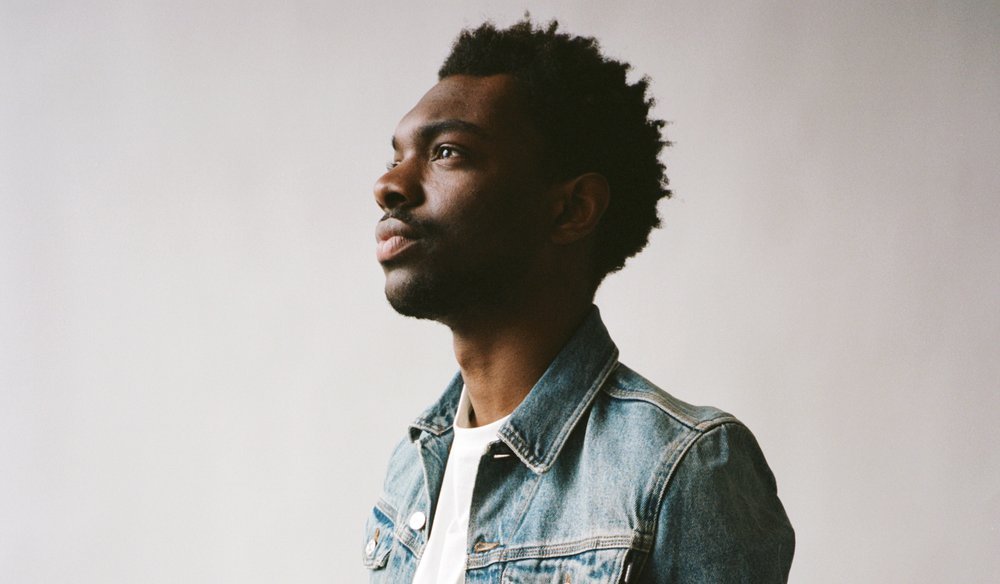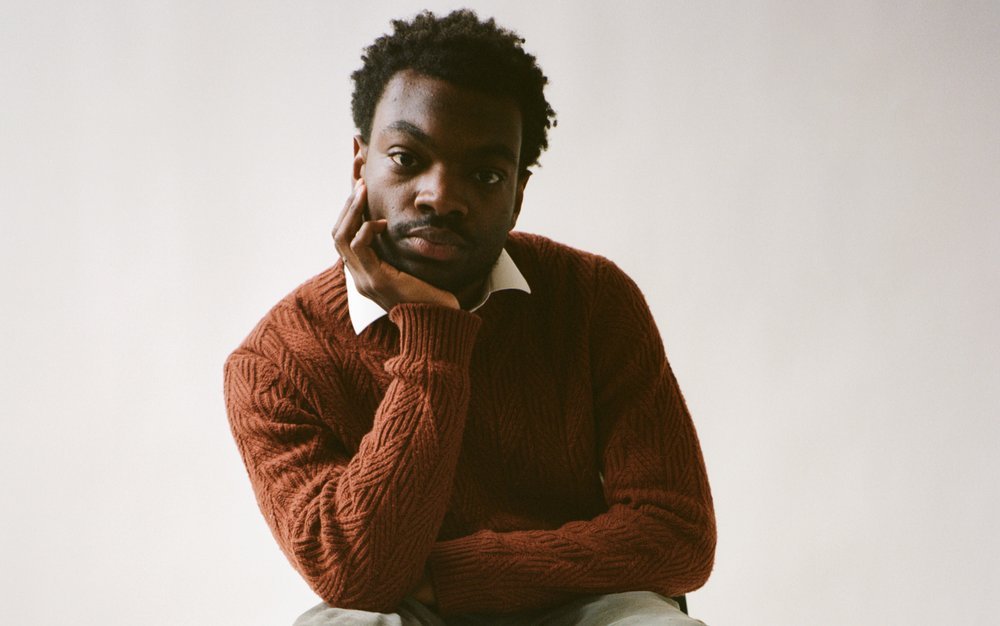ALL STAR FILMMAKER IBRAHIM MUHAMMAD IS REWRITING THE SCRIPT WITH CONVERSE AND JOHN BOYEGA
Photography By Rhys Williams
Meet Ibrahim K. Muhammad, who alongside fellow filmmakers Ade Femzo, Kaylen Francis, Kemi Anna Adeeko and Lorraine Khamali, is part of Converse’ ‘Create Next’ Film Project - The community-driven initiative aimed at bringing the next generation of Black filmmakers into the spotlight by giving them the resources and mentorship to create a five-minute short film. “We were given total creative control and freedom, which is why we all have such different script ideas amongst us - one person has a hood comedy, another a superhero VFX movie, whilst I’m working on a drama,” explains Ibrahim.
It wasn’t until the end of August, whilst preparing for the academic year ahead for his Film degree at the University of Westminster, that he ended up on a Zoom call with four other young filmmakers from London and Golden Globe winner John Boyega. Unbeknownst to him, this call would trigger the beginning of a journey that would not only see him featured on ad campaigns around the world, but with the opportunity to tap into a network of resources and expertise.
Balancing a promotional rollout and writing, directing and producing a short film alongside University is no easy feat. “There was a lot of juggling where I’d have to cancel meetings with producers because I had university deadlines.” Indeed, after a flurry of back and forth he ended up writing six drafts, a testament to the meticulous approach the former BRIT School student takes to his work. It was this pursuit of ‘perfection’ that left him at times frustrated and unsure of himself in the process of producing his film for the project, with an experienced crew of casting directors and professional actors. “I wasn’t sure whether what I’d written would communicate well on-screen in my first professional directorial debut, but the actors had done their homework and asked questions and there was so much support from the team at Bounce Cinema,” he explains. Navigating his fears and having questions answered with the reassurance of experienced professionals allowed him to explore his craft without the stress or worry of the other key elements of a production that take so much time - from costume to lighting to movement.
Used to being a one-man band, Ibrahim had to learn how to manage teams and expectations, his biggest lesson from the experience being understanding how to lean into his own talent and trusting himself and the process, “Learning to go with the flow, trust the team and not doubt myself was the biggest takeaway for me,” he reminisces.
After decades of marginalisation and erasure of Black people and culture in filmmaking, Ibrahim hopes to not only champion Black stories but challenge them too, using his professional debut to explore “Realistic topics without the expected outcomes.” His lead character, a Black woman, spends most of the film venting and expressing herself to her estranged father. The symbolism in giving a Black woman a voice - an emotional and expressive one at that - to those who are often relegated to secondary roles ( if they are featured at all) is not lost.
His genre-blending project flits between drama and tragedy, exploring the relationship between an estranged father and child, with a twist at the end. “We’ve seen the sad Black story so many times, so it was important for me to end the movie on a note that changes the narrative and the expectations of the ‘estranged father’ narrative,” he explains.
The first time Ibrahim picked up a camera was when he tried to recreate the infamous YouTube ‘Lego’ movies using the camera on his mum’s mobile phone. Picking up skills such as editing, lighting and shooting he “Managed to translate all the information I’d picked up as a child making these short films into live action when I began attending the BRIT school to study film,” says Ibrahim.
As much as he strives to tell stories through his work, Ibrahim has grown up an avid consumer of them. Namely through weekly cinema visits with his dad growing up, Ibrahim doesn’t underestimate the power of storytelling through the medium of art and visual expression. From going to the cinema with his dad every week and drawing his favourite superheroes, which evolved into studying Fine Art at GCSE, this later transitioned into Photography - a medium he found more accessible than drawing, with quicker results than painting. “Photography is great because it’s a way of manipulating reality. You take a photo, but it doesn’t necessarily mean that it’s true to what’s happening in real life,” he explains. It was then a natural evolution for him to study Film when arriving at the BRIT school despite never having formally studied it before.
Although he draws inspiration from his own artistic experience and influences, Ibrahim is yet to define his style, something he expresses excitement about and looks forward to developing, having had the platform to hone and experiment through the ‘Create Next’ Film Project. “The cinema culture I grew up with helped me understand the importance of visual storytelling. When it comes to idea generation, it’s easier to take inspiration from what you consume and rejig it - whether it’s movies, photography, art or music.” For him, the power in filmmaking lies in inventing your own reality - telling real stories through contrived characters - and thus impacting the realities of lived experience. “I haven’t found my storytelling style but I know for a fact that the work I will go on to produce will be grounded in reality, because it’s only by working within the realms of reality that you’re able to influence people’s perception of it,” he expresses in response to where he sees his artistic direction going in the next few years.
Born in 2002 and following true Gen-Z style, Ibrahim also looks to social media for inspiration, with a carefully curated Instagram feed consisting of artists, producers, directors and musicians providing an endless well of inspiration. He is at heart, a visual creative that sees himself untethered by categories of occupation.
Alongside this, another source of creative insight is the medium of music videos, an underappreciated art form as platforms such as MTV base falter in popularity in the age of short-form video. Pointing to music video directors such as David Fincher, Spike Jonze and Michel Gondry - all film directors who also worked as music video directors, he refers to the similarity in the importance of explicit visual communication - music video directors have the added complexity of a couple of minutes and a song to create their work alongside. “Music is a big part of how stories are told, and can convey so much emotion, especially in film. I spend time on the bus or the train listening to songs and making up videos for them in my head!” Ibrahim laughs. He explains further that a music video does “What art cinema tries to do, in thinking outside the box and packaging abstract ideas in a more condensed and accessible form.”
It was through music videos, namely Kendrick Lamar’s ‘Element’ that Ibrahim discovered the like of Civil Rights era photographer-turned-director and filmmaker Gordon Parks, who “Captured such an important time in history and Black culture in a way that looks so set up, and almost staged, because he was so good at documenting the exact right time.”
In the same vein of accessibility, many aspiring filmmakers find difficulty in breaking into the industry, not least due to the expensive equipment. To them, Ibrahim’s advice is to demystify the film industry by taking the first step towards creating art in their everyday lives, whether it be taking pictures of their friends or taking the leap to connect with like minded individuals and create using a community’s collective skills. “Pick up a phone, write a short story and build up a collection of moments,” he advises raw filmmakers with limited budgets and big dreams.


